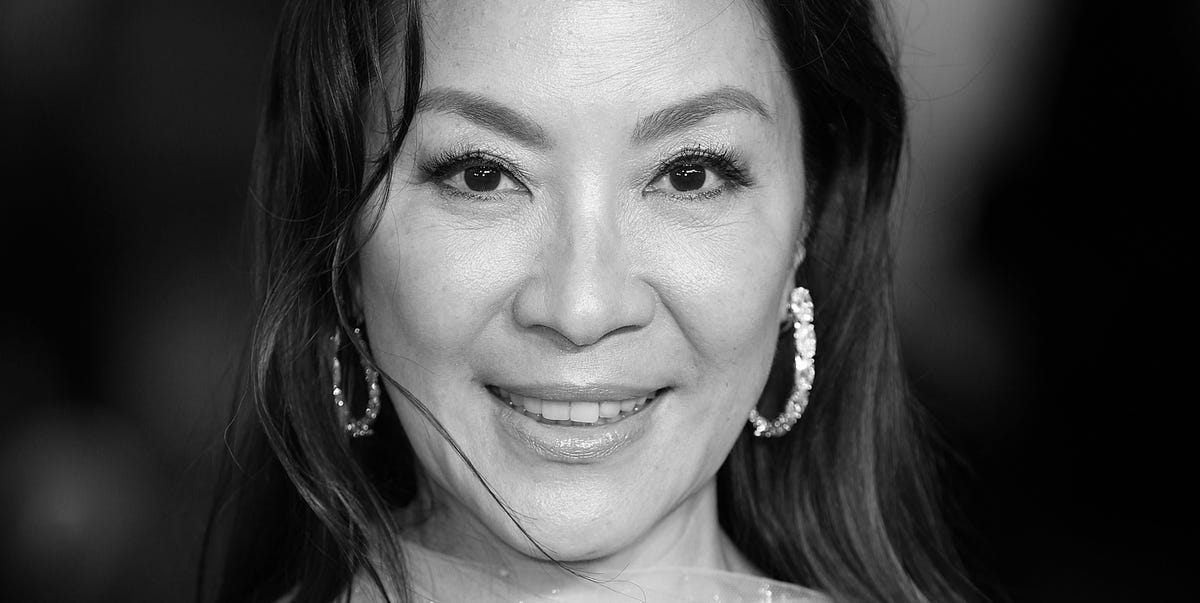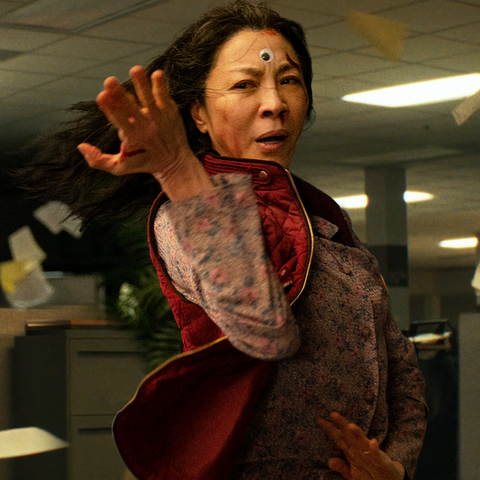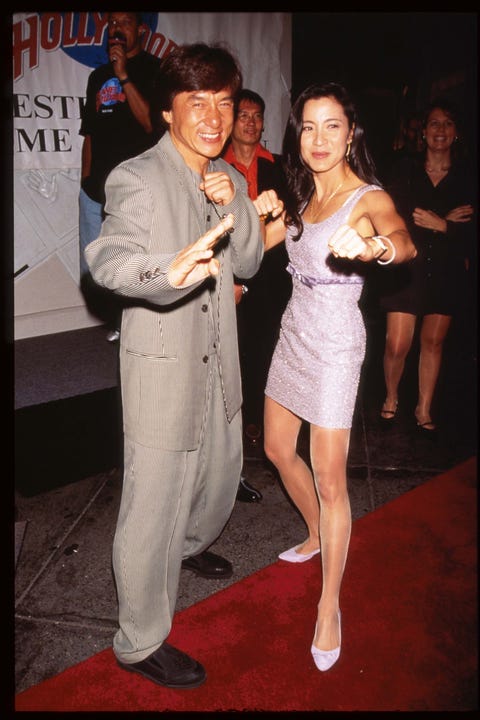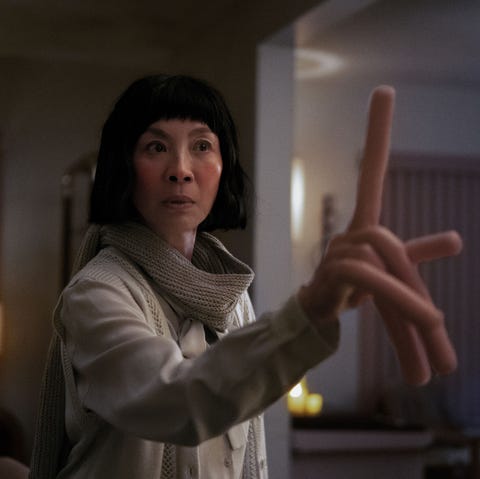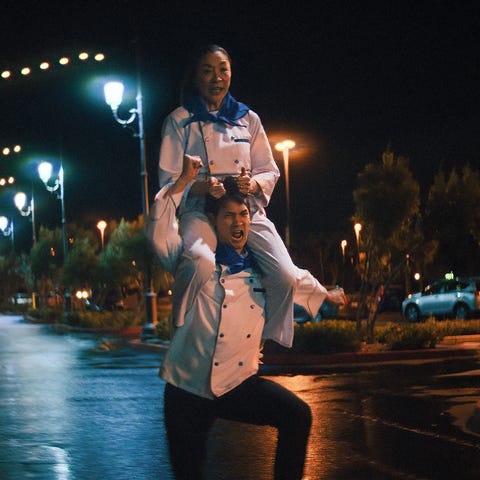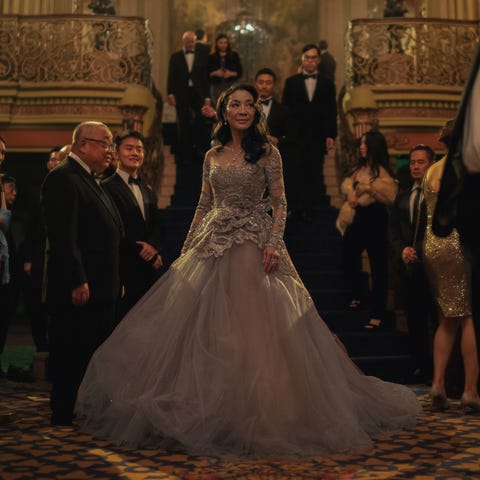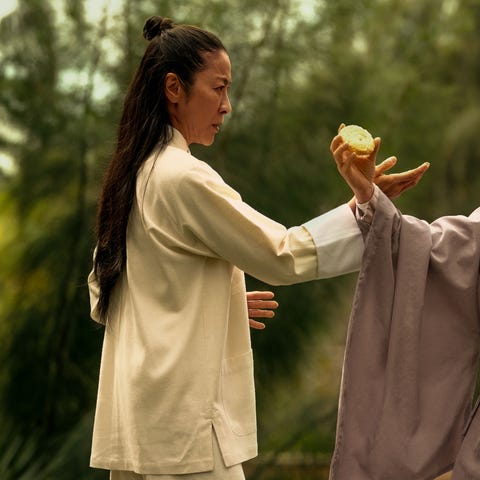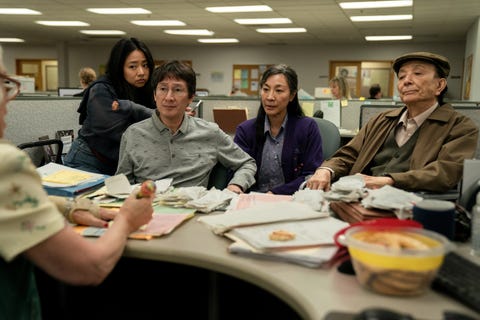Michelle Yeoh will never forget the day Daniel Kwan and Daniel Scheinert—the filmmaking duo known as the Daniels—broke her brain on the set of their new multiversal, genre-breaking sci-fi action dramedy Everything Everywhere All at Once.
It was in the early months of 2020, just before the COVID-19 lockdown, and Yeoh was shooting a fight sequence with Andy and Brian Le, a couple of stuntmen who grew up watching her in classic martial arts flicks, in an abandoned office building in California’s Simi Valley. In the scene, Yeoh’s character, Evelyn Wang, uses her newfound skills—and a trusty old keyboard—to fight a man wielding two metal pipes. But when the technology used to “verse-jump,” or connect with their counterparts from parallel universes, goes awry, Evelyn and her unnamed opponent lose their abilities to fight, leading to a scene that uses slapstick, physical comedy—and a couple of makeshift butt plugs.
“That [scene] cracked me up. I just collapsed on the ground, looked at the heavens and went, ‘What have the Daniels gotten me into?! What has my career downspiraled to?!’” Yeoh tells ELLE.com over Zoom with a hearty laugh. “It was hysterical. It took me a while to get up off the ground. The Daniels were like, ‘Come on, Michelle. Are you okay?’ I was like, ‘Just leave me alone. I don’t know what to do anymore.’”
That was a recurring thought for Yeoh, 59, while filming the Daniels’ sophomore feature film, a maximalist assault on the senses that centers on a Chinese American woman undergoing a tax audit for her failing laundromat business while her familial relationships begin to fall apart. It’s a leading role that Yeoh, one of the most recognizable Asian actresses of the last three decades, had been unknowingly preparing to play for most of her career—and one that has allowed her to showcase her full prowess as a performer.
Yeoh, however, never planned to be an actress; she moved from her native Malaysia to London at the age of 15 and later studied at its Royal Academy of Dance, with dreams of one day opening her own dance studio. But a back injury quickly threw a wrench in those plans, forcing her to shift her studies and pivot for the first of many times in her life.
In the early 1980s, a good friend recommended Yeoh—who was crowned Miss Malaysia in 1983—for a TV wrist-watch commercial with Jackie Chan, and D&B Films, a nascent Hong Kong-based production company, subsequently offered her a film contract. In 1984, Yeoh made her professional acting debut in The Owl vs. Bumbo, a Hong Kong action comedy film led by Sammo Hung and George Lam, where she played, as she puts it, “the damsel in distress.” But as she watched her co-stars engage in onscreen hand-to-hand combat, Yeoh quickly realized that the fight sequences went hand-in-hand with her years of dance training, “because everything was choreographed, and then it was like this whole big musical—without the singing, of course—that unfolded in front of me,” she explains.
And while the Hong Kong film industry was dominated by the likes of Hung, Chan and Jet Li, Yeoh asked the producers of her second film—the female buddy comedy Yes, Madam (1985)—if she, too, could get in on the action. She didn’t know how to read Mandarin, nor did she know how to read or speak Cantonese very well, “so I thought, ‘Well, maybe I could hide behind some physical action for a little while as I’m learning other things,’” she recalls. With nothing to lose, the producers agreed, and Yeoh dedicated herself to learning how to do her own stunts, quite literally rolling with the punches that have defined most of her career.
After a four-year break, Yeoh made her triumphant return to the screen alongside Chan in the 1992 action classic Supercop, in which she executed two of the most death-defying stunts of her career: rolling off a van onto a moving convertible and riding a motorcycle onto a moving train. A few years later, however, she was not as fortunate. While filming The Stunt Woman (1996), she was hospitalized with cracked ribs and a fractured vertebrae after misjudging an 18-foot jump from a bridge onto a moving truck, forcing her to consider quitting acting once more. It’s rumored that Quentin Tarantino was the one who talked her out of an existential depression—and not a moment too soon. In the last 25 years, Yeoh has steadily raised her international profile with a bevy of memorable roles across film and television, playing a Chinese secret agent and reimagined Bond girl (Tomorrow Never Dies), an enigmatic, sword-slinging balletic warrior (Crouching Tiger, Hidden Dragon), a graceful Japanese courtesan (Memoirs of a Geisha), a Burmese politician who has since fallen from grace (The Lady), a Starfleet captain and ruthless emperor (Star Trek: Discovery), and a domineering, relentlessly protective mother bound by duty and family (Crazy Rich Asians).
It was during the press tour for Crazy Rich Asians, in the summer of 2018, that Yeoh asked to meet with the Daniels, whom she has lovingly dubbed her “evil geniuses” for giving her the role of a lifetime. As someone who has “always been very open to receiving scripts from young directors” who have a distinctive voice, Yeoh, who has played the supporting role of the mother or the aunt in recent years (just don’t ask her to play a grandmother yet), says she had not read a script like Everything Everywhere in a very long time, let alone a lead role that was specifically written for her. “When I read the script, I was like, ‘Okay, either these two are certifiably insane, or we have something going on here,’” she quips.
But before sitting down with the Daniels, she watched their debut feature Swiss Army Man, which starred Daniel Radcliffe as a flatulating corpse. “I thought, ‘Okay, I think maybe I’m beginning to understand a little bit of how these two work.’” In their meeting at the Beverly Wilshire, Yeoh “could feel the fire, the passion, their cleverness and their vision of what they were trying to achieve, and I love a challenge.” But she had only one note: The protagonist could not be named Michelle. Evelyn is a very ordinary, aging Asian immigrant woman, Yeoh says, and this story gives voice to the mothers, aunties and grandmothers whose stories are often overlooked and who don’t want to rock the boat in pursuit of the American dream for their families.
“This was the first time where I read this Asian immigrant woman [who] was the superhero in this movie. Evelyn Wang deserves her voice, to be heard—through the story that she has to tell and the people that she loves in her world,” Yeoh says. “And also what excited me was it encompassed so many different genres of film, and the only way they could really push this forward is [using] science fiction. In science fiction, you can really, really push the envelope to the stratosphere … so it’s like there’s almost like five genres of films in one movie. I get to do comedy, physical comedy, drama, romance, it’s a love story.”
And while the film has garnered a lot of attention for its abundance of multiverses (Yeoh plays a wǔxiá warrior, a hibachi chef, an opera singer, a rock, a pizzeria sign holder, a lesbian with hot dog fingers and an internationally famous movie star, just to name a few), the actress says the story, at its core, highlights themes of self-sacrifice and intergenerational trauma, which are common to a lot of Asian families.
In Evelyn’s case, she immigrated to the United States with her husband Waymond (Ke Huy Quan) against her father’s (James Hong) wishes—and now she, in turn, is struggling to connect with her rebellious daughter Joy (Stephanie Hsu), who is also openly queer. Evelyn is essentially faced with a generational gap on both fronts: She worries that she “did not teach her [daughter] about filial piety properly” and the importance of honoring their Chinese heritage, and she does not want “her father to see that she’s a failure, that her husband did not become this big, wealthy, successful businessman and the laundromat that they are running is being audited.” (Handling the audit is Jamie Lee Curtis’ Deidre Beaubeirdra, an IRS inspector whose fervent commitment to her job masks the scars of her loneliness.)
Every character is so well-written, Yeoh says, that viewers can understand where they’re coming from, which highlights Everything Everywhere’s underlying message of empathy to help bridge the cultural and generational divide in immigrant families. “In all the different universes, you discover these people. They are trying to find each other—and we are all trying to find a human connection that makes us who we are.”
The members of the Wang family “were very ordinary, but then they sort of became superheroes, and I think one of the best things we do learn is we all have a superpower within each of us, which is kindness,” Yeoh adds. “And if you remember the big, beautiful speech that Waymond gives, it’s like, ‘We have to stop fighting with each other. We have to show each other kindness, be kind to each other.’ That is one of the most powerful messages that we have that resonates with you. Because in all the chaos, you suddenly get a grip of all these real connections—not just with this family, but with each other. I think everyone in the cinema when they’re watching it, they feel it together collectively, they feel that they understand it.”
For most of her career, Yeoh has emerged as a leading advocate for Asian representation, so it hardly feels like a coincidence that she has starred in three of the most groundbreaking Asian-led projects in recent years—Crazy Rich Asians, Shang-Chi and the Legend of the Ten Rings, and now Everything Everywhere. The first movie, in fact, was what inspired her onscreen husband, Ke Huy Quan, who is best known for his work in The Goonies and Indiana Jones and the Temple of Doom, to return to acting after two decades of working behind the camera. “Ke delivered” in his comeback to the big screen, Yeoh says, “and it’s wonderful working with him because first of all, he’s hysterical, he really is very funny. So when he’s Waymond, the loving husband and father, you know the one who is always looking for the joy in life, and then Evelyn looks at the husband and goes, ‘Come on! Be serious! Our business is not doing well!’”
The deep love that Evelyn and Waymond share—as the mother in charge and the doting father of Joy—will feel familiar to a lot of Asian families. But in other universes, Evelyn is forced to contemplate what her life could have been if she hadn’t married Waymond, which ultimately brings them back together. “Like all relationships after 20-odd years, you take each other for granted, you don’t communicate as well, you don’t communicate full stop,” Yeoh says. “But then when she came to the realization that ‘I don’t have a husband, I don’t have my Joy,’ it is very reflective of when we are going through dire times and great difficulties and thinking, ‘Oh my God, I should just pack it all in.’ That’s when we find what is important to us, and then we have to step back and not let our ego and our pride get in the way and listen.”
Yeoh will celebrate her 60th birthday in August, but she shows no signs of slowing down. She has three more live-action projects scheduled for release this year: The Witcher prequel series Blood Origin (in which she plays an elf with green eyes), Paul Feig’s Netflix fantasy film The School for Good and Evil, and the first Avatar sequel, which is slated for a theatrical run starting in December. For the last couple of months, Yeoh has been shooting the Disney+ adaptation of Gene Luen Yang’s acclaimed graphic novel American Born Chinese in Los Angeles.
At this stage of her career, Yeoh has largely avoided playing characters that lack any nuance or characterization, making her illustrious résumé the exception rather than the norm compared to many of her contemporaries. While she acknowledges that most, if not all, actors worry about typecasting, Yeoh has learned with time that it’s simply part of the business and feels privileged enough to be in a position where she can now choose her own projects and continue to expand people’s perceptions of what she can do as an actress with like-minded creatives.
“Choosing to work on a project is very important and very special to me, because if I choose to be away from the people that I love and my family for months on end, I better be doing that for a very, very good reason,” Yeoh explains. “And one thing for me is the people that I work with, they’re not just doing a job because they’ve just been given the job to do. It has to be a passion; it has to be love.”
Everything Everywhere All at Once is now playing in theaters.
This content is created and maintained by a third party, and imported onto this page to help users provide their email addresses. You may be able to find more information about this and similar content at piano.io
